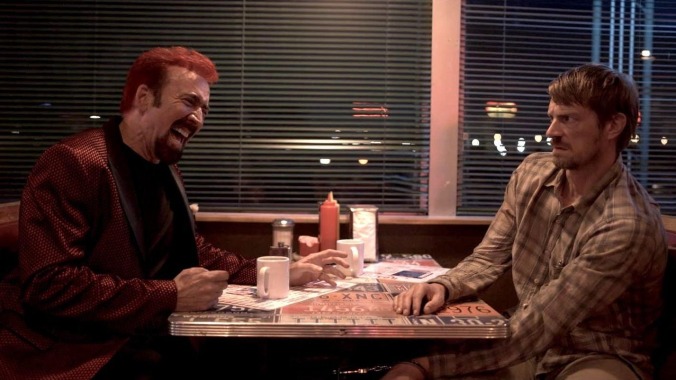Sympathy For The Devil review: Meet your new Nicolas Cage memes
In this oddly satisfying thriller, Cage plays a mysterious hitman with Satanic fashion sense who forces Joel Kinnaman to drive him around Las Vegas

In 2013, it was mostly serious cinephiles who saw the movie Locke, in which Tom Hardy traverses the highways at night, trying to get to his mistress who’s going into labor. It’s pretty much a one-man show, with Hardy’s Locke taking calls to try to keep everything running smoothly as he’s stuck in transit. While watching the new movie, Sympathy For The Devil, one assumes director Yuval Adler (The Secrets We Keep) and writer Luke Paradise were among those who saw Locke, and thought, you know what this needs? Nicolas Cage in the back seat dressed like Satan.
They’re not wrong. A case could be made, in fact, that every movie needs that. With his rooster-red coif matching his jacket’s outer lining, and the rest of his ensemble as black as his goatee, Cage looks as close as a human being can to a Coop drawing, short of painting his actual skin red and attaching a tail. He’s not, unfortunately, playing a literal Satan, but you can bet the actor took most of his character creation cues from ol’ Scratch. Except maybe the Boston-ish accent that comes and goes (“My mutha. She’s dyin’ of cansah. Lung variety.”) The King of Hell is apparently a New England Catholic, at least in Nicolas Cage’s head.
Joel Kinnaman takes Tom Hardy’s place in the Locke-like role of David, driving through the less visually distinctive parts of Las Vegas to get to his wife, in labor again following a recent miscarriage. Almost there, and almost out of gas, he’s stymied when Cage’s devilish interloper invites himself into the back of his car and, after attempting a terrible card trick, pulls a gun and tells David to drive.
The passenger, whose real name we never learn for sure, won’t tell David what he’s up to, but he gleefully baits a traffic cop into a bloody death just to make the point that he’s nutty, armed, and dangerous. He also does everything you’d expect Cage to do, whether you know it or not. He squawks like a bird. He sings along to Alicia Bridges’ 1978 disco classic, “I Love The Nightlife,” on a jukebox. He does an impersonation of Edward G. Robinson (you know, for the kids). He screams in people’s faces. He tells childhood stories about an imaginary sinusitis-inducer named the Mucus Man. And in a moment destined to be memed forever, he loudly and lengthily yells “SIIIIT THE FUUUUUUUCK DOWN!” Cage may hate that people quote his over-the-top moments out of context, but since this entire movie is one, you can’t really take any of it the wrong way.
At this point in the review, you kinda know if you’re down for this trip or not. Suffice it to say if you liked Cage as Dracula in Renfield, you’ll love him as a Satanic hitman. Sympathy For The Devil may even be the best movie about Nicolas Cage leaving Las Vegas, depending on which manifestation of Cage you prefer. For the most part, Adler’s efficient direction beats Mike Figgis’ pretentiousness, though when it comes to movies about drivers forced to ferry around dangerous hitmen, this is no Collateral, despite the similar brown tones of the visuals. Tom Cruise and Jamie Foxx played the scenario more toned-down than usual, while Cage doesn’t know the meaning of that phrase.
The movie is set in and around Las Vegas and was also shot there, but apparently mostly on an indoor Volume-like LED-screen set. It doesn’t show. Sure, there’s a moment near the end where everything catches fire and you may wonder how even libertarian Nevada let them do that outside. But without knowing in advance, you’d never suspect inside-for-outside shooting at work. Perhaps, like the card trick Cage enters the movie with, it’s misdirection; throw this particular star into a movie with Kool-Aid-colored hair, and nobody’s eyes, critical or otherwise, will likely fall upon anything else.
Except perhaps the ending. When the tables inevitably turn, they involve some complicated backstory that’s hard to focus on or clarify, and which appears to significantly retcon what we’ve seen from David. In the end, it’s still not entirely clear what specific wrong was done, and by whom, that set everything in motion. Given a paper and pencil, one could perhaps plot it out. But that would mean taking our eyes away from Cage.
Perish the thought.
Sympathy For The Devil opens in theaters July 28